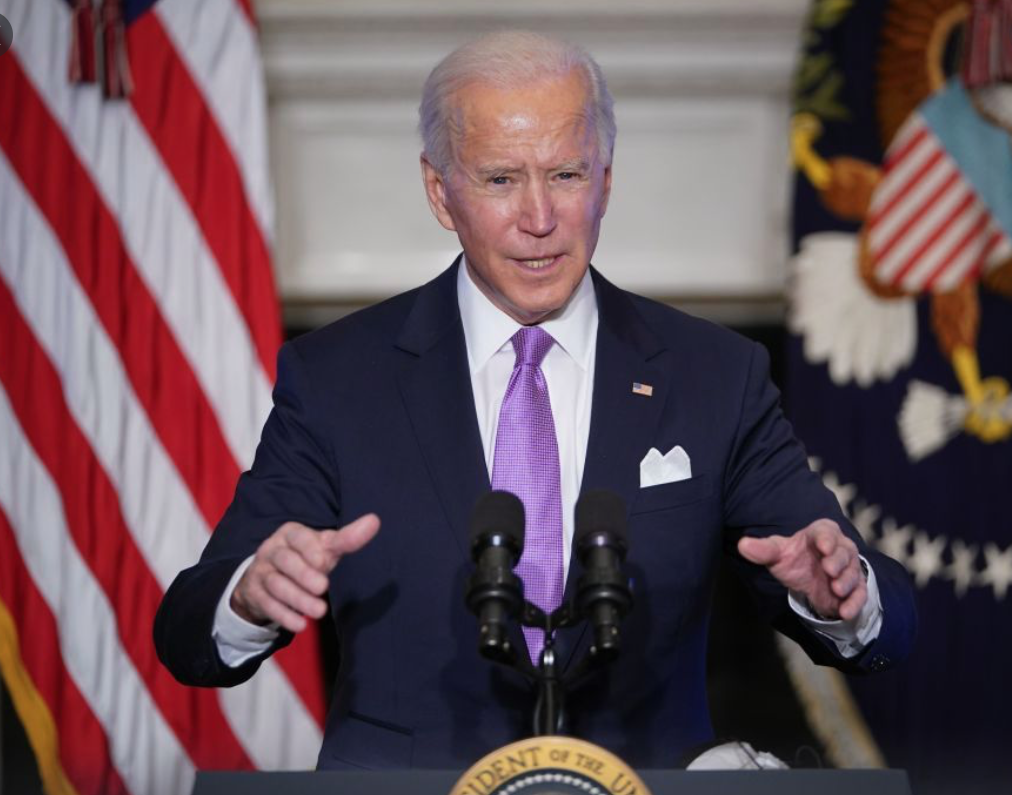Turning The Page: For Biden, A Week of Scores A Reminder of What Needs to Be Done

Image Courtesy of KTLA
By Justin Lamoureux
Record amounts of snowfall brought much of the country to a standstill. Elon Musk shook up Twitter by moving markets. Jeff Bezos stunned the business community when he announced his resignation as Amazon CEO. Last week was highly eventful for much of the country—and Joe Biden’s presidency was no exception.
Biden’s most significant accomplishment last week undoubtedly lies in the congressional endorsement of his COVID-19 relief package. This plan, designed by President Biden, calls for $1.9 trillion to be directed towards expediting vaccine distribution, assisting small businesses, reopening schools, and increasing state and local budgets. Said relief package was countered by ten senate Republicans, who themselves proposed a smaller deal with similar objectives, but which offered “more targeted assistance” to Americans in need and would come with a smaller price tag.
The group—which included Senators Susan Collins (R-ME) and Lisa Murkowski (R-AK)—met with President Biden last week in the Oval Office. Concerns they held regarding Biden’s proposal included that an excess amount of funds were being allocated to individuals and businesses who have not experienced considerable economic hardship as a result of the pandemic. While both sides emphasized the need for political unity, however, no compromise was reached before the meeting concluded. Whereas Republicans hold reservations about Biden’s plan being too extensive, Democratic leadership in Congress worries that failing to designate an adequate budget for relief will result in a slowed recovery, as happened during the 2009 financial crisis.
Ultimately, however, Republican objections to the administration’s relief package held little bearing, as both chambers of Congress voted in support of the measure on Friday. The House of Representatives approved the measure 219 – 209, while the Senate was evenly divided. Vice President Kamala Harris effectively prevented a stalemate by casting a tie breaking vote. While various provisions of the relief package remain subject to approval by the Senate budgetary committee, this constitutes an apparent victory for the Biden administration and congressional Democrats alike.
The COVID-19 relief package was not Congress’ only nod to the administration last week. The Senate also confirmed an additional two of the president’s cabinet nominees: Transportation Secretary Pete Buttigieg, and Homeland Security Secretary Alejandro Mayorkas. Both nominees make history with their respective confirmations—Buttigieg as the first openly gay cabinet secretary to be confirmed by the Senate, and Mayorkas as the first Latino secretary (and immigrant) in his respective department’s history. However, whereas Buttigieg received seemingly well-grounded bipartisan support (he was confirmed by a vote of 86-13), Mayorkas’ nomination was faced with substantial Republican opposition (43 of 50 – or 86% – of Senate Republicans voted against his confirmation).
Biden may have experienced relative success in navigating an increasingly polarized Congress, but he still faces a comparably daunting task: facilitating the return of 20 million American students to the classroom. Last week, the president made it clear that his administration intends to prioritize reopening public schools nationwide. “It’s time for schools to reopen safely,” Biden declared in a televised interview with CBS’s Norah O’Donnell.
While the CDC hopes to release guidelines for the reopening of classrooms as early as this week, a number of prominent teachers’ unions are now demanding that educators receive priority for vaccination as a condition of returning to school in-person. CDC director Dr. Rochelle Walensky has said that vaccination of teachers “is not a prerequisite for safe reopening of schools,” citing data which indicates a correlation between increased precautions (e.g. social distancing and mask wearing) and substantial decreases in the spread of COVID-19 in a typical school setting. Most teachers’ unions agree that said precautions are largely effective, and that vaccinations should not be a requirement for schools to reopen. The problem, however, is that ventilation updates, along with other important measures recommended by health officials, are long overdue in many school buildings. President Biden seemed receptive to this issue, promising that CDC officials would produce a “science-based judgment” for how all schools could safely welcome students back.
Last week also saw the White House develop a new strategy for hastening the rollout of vaccines. In conjunction with the Pentagon, more than 1,100 troops will be deployed across the country to establish vaccination centers, and oversee administration, on behalf of the Federal Emergency Management Agency (FEMA). White House coronavirus adviser Andy Slavitt hopes that “the military’s critical role in supporting sites will help vaccinate thousands of people per day,” and ensure that “every American who wants a vaccine will receive one.” Slavitt anticipates that troops will arrive at their designated postings in the next 10 days, and set up 100 vaccination centers within the next month. Such efficiency might translate into necessity, as the new strain of COVID-19, which originated in the United Kingdom, is becoming dominant in the U.S. Given the exceptionally contagious nature of this variant, the Biden administration currently faces increased pressure to vaccinate millions of people and keep an outbreak of greater severity at bay.
The ongoing threat of COVID-19 may keep U.S. borders closed to most international travelers, but last week Biden announced plans to increase the number of refugees admitted to the country on an annual basis. Currently standing at 15,000 per year—a historic low adopted by the Trump Administration—Biden hopes to raise this figure to 62,500 during the next fiscal year. Ultimately, the president aims to increase the cap even further, to 125,000 per year. This number would be 15,000 higher than the highest quota established by the Obama Administration. Conversely, hundreds of individuals have been deported from the U.S. since Biden took office, despite his campaign pledge to discontinue the removal of undocumented immigrants in the beginning of his term.
The jury is still out regarding the effectiveness of President Biden’s most recent steps, but the groundwork is being laid. The imminent passage of a COVID-19 relief bill equates to assistance being one step closer for millions of Americans. Additional personnel being enlisted to partake in rolling out vaccines will likely have the effect of moving the inoculation timetable forward. Concrete steps for planning a return to in-person learning will likely provide school districts with additional guidance regarding their objectives moving forward. Not to mention, having an additional two cabinet secretaries in office will provide the White House with greater leeway regarding specific policy objectives. Most of the last week’s developments have yet to materialize, but they still put President Biden and his administration in a seemingly good position moving forward.






